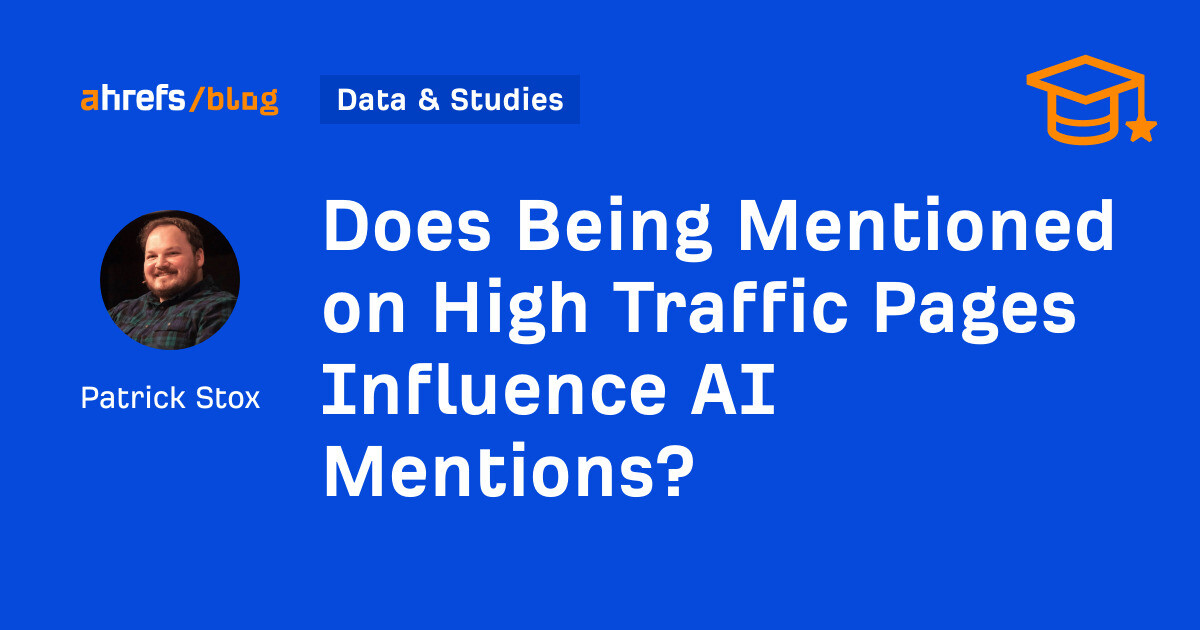Next big thing after AI: Quantum computing is 158 million times faster than today’s computers
What was once a concept that seemed like science fiction is now a reality, with both the government and several Singapore startups embracing this tech.

Generative artificial intelligence (AI) has definitely taken the world by storm, but what lies beyond this groundbreaking technology?
Upcoming tech like nuclear fusion and AI always seem to be about five years away — whatever the year. However, quantum computing, a concept that once seemed like pure science fiction, may be on the verge of finally becoming a reality.
In fact, the global quantum-computing market totalled about US$614 million in 2022 and is expected to grow more than 25 per cent a year, reaching roughly US$1.2 billion in 2025.
There are multi-billion dollar opportunities for quantum technology, with over 100 real-life use cases. But before we delve into the transformative power of quantum computing, let’s start with the fundamentals: what even is a quantum computer, and how does it work?
The fundamentals of a quantum computer
At its core, a quantum computer is a super-powered computer that operates on the principles of quantum mechanics, a branch of physics that describes the behaviour of very tiny particles like atoms and photons.
In a regular (or classical) computer, information is stored in “bits”, which are a stream of electrical pulses representing binary digits 1 or 0. Everything from your Tweets (or rather, Xs now) to your emails and YouTube videos are essentially made up of long strings of these binary digits.
Quantum computers, on the other hand, run on “qubits” (short for quantum bits), which typically consist of subatomic particles that can exist in multiple states at once. A connected group of qubits can provide way more processing power as compared to the same number of binary bits.
To put this in perspective, think of a quantum computer as a powerful tool that can explore multiple possibilities simultaneously — akin to searching for a specific item in a vast library by simultaneously checking multiple books at once, rather than flipping through them one by one as a classical computer would.
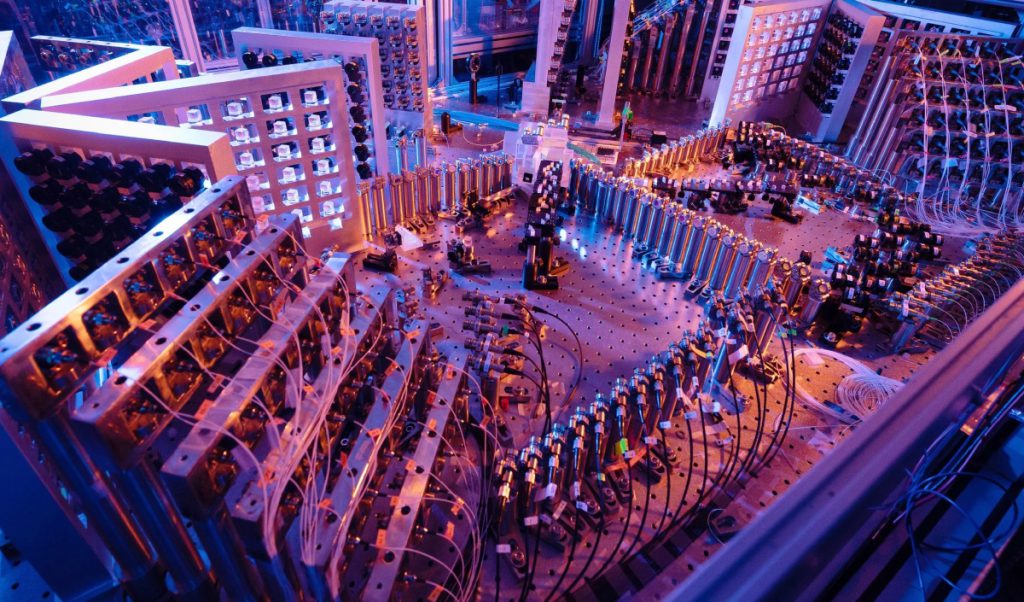 China’s Jiuzhang quantum computer takes less than a second for a task that the fastest classical computer in the world would take five years to solve/ Image Credit: University of Science and Technology of China
China’s Jiuzhang quantum computer takes less than a second for a task that the fastest classical computer in the world would take five years to solve/ Image Credit: University of Science and Technology of ChinaIn fact, a quantum computer can perform calculations 158 million times faster as compared to the fastest classical computers today. This means what would take traditional computers 10,000 years to complete would be accomplished by quantum computers in a mere four minutes.
However, generating and managing qubits still pose scientific and engineering challenges, and come at a hefty cost. Qubits are incredibly sensitive to their environment, and external factors like temperature fluctuations and electromagnetic interference can disrupt qubits, leading to errors in calculations.
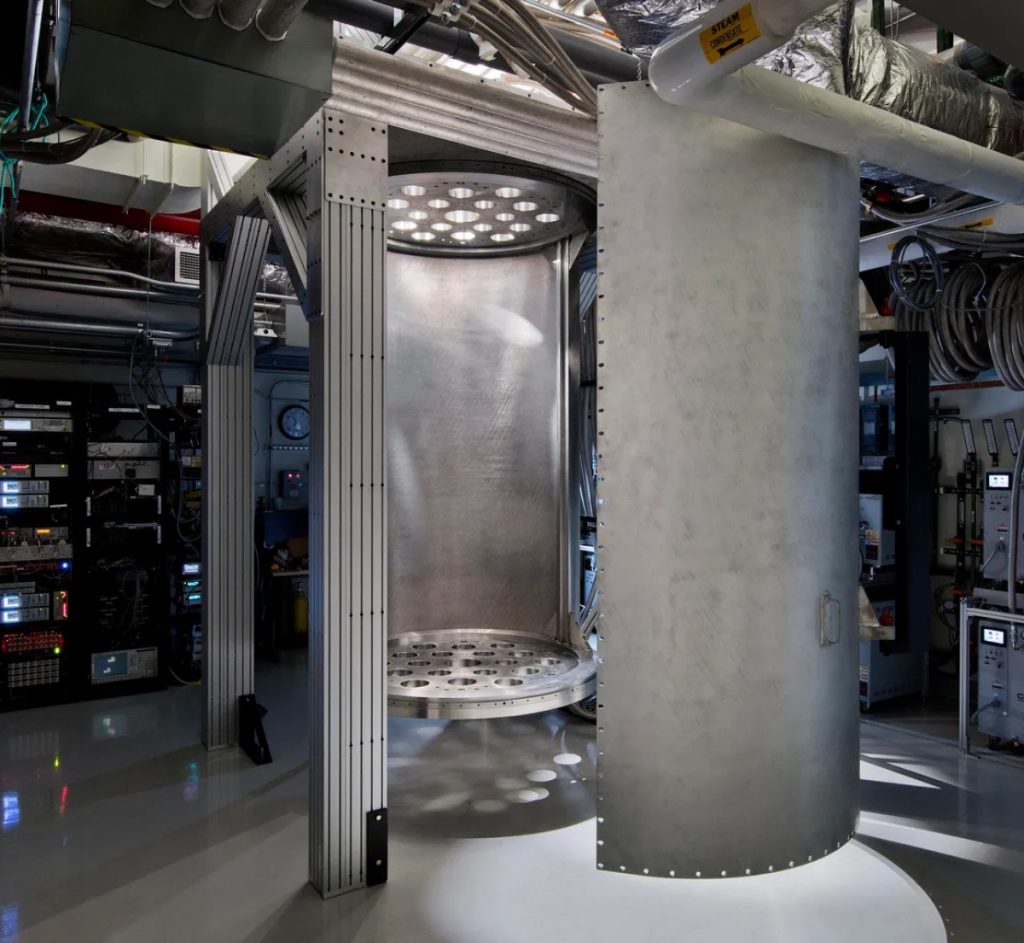 Goldeneye, the world’s largest dilution refrigerator/ Image Credit: Connie Zhou/ ZDNET
Goldeneye, the world’s largest dilution refrigerator/ Image Credit: Connie Zhou/ ZDNETThe most common type of quantum systems is typically kept inside dilution refrigerators that maintain temperatures close to absolute zero (-273.15 degrees Celsius) — temperatures even colder than Antarctica — as heat can cause interferences to these systems. These refrigerators can easily cost upwards of US$500,000, and require regular servicing that can amount to an average of US$20,000 per year.
On the other hand, trapped ion quantum systems — a relatively new type of quantum computer — that rely on electric fields and laser manipulation to produce accurate outputs can cost between US$200,000 and US$500,000.
Additionally, the lasers used in trapped ion systems also require calibration and replacement, which adds to their maintenance costs. Overall, the annual maintenance and upkeep can add another US$50,000 to US$100,000 to the total cost of owning a quantum computer.
Is quantum worth the effort?
Despite the costs and challenges that come with owning and maintaining quantum computers, many firms are still betting on the tech.
According to a study done by Boston Consulting Group, the high costs associated with quantum computers are only but a fraction of the value added derived from the tech. In fact, it can create US$450 billion to $850 billion in net income for end users through a combination of new revenue generation and cost savings.
Amongst the firms that have invested in the tech, the study found that there is limited buyer’s remorse. Nearly all users plan to maintain or increase their spending in quantum computing in the coming years.
Some of these aggressive early adopters are even eager to double down and extend their competitive advantage, with 80 per cent of them planning to increase spending year over year.
Here is a look at some companies that have integrated quantum solutions in their business:
Crafting the future of EVs with quantum computing
Mercedes-Benz, in partnership with its research partners Google and IBM, is currently exploring quantum computing to accelerate the development of advanced battery materials and battery systems for its electric vehicles (EVs), in line with its aim to produce carbon-neutral vehicles by 2039.
 A chromatic blue Mercedes-Benz SLS AMG Electric Drive/ Image Credit: Ludo Vic
A chromatic blue Mercedes-Benz SLS AMG Electric Drive/ Image Credit: Ludo VicWhile there are many barriers to widespread EV adoption, the greatest limitation is battery technology. Currently, the primary source of energy for EVs is lithium-ion batteries. However, these batteries generally can’t store as much energy as a car battery, causing EVs to have shorter ranges.
Additionally, they have a shorter shelf life as compared to the life span of a traditional car battery — almost half of the traditional car battery’s life span, in fact — and are vulnerable to extreme heat and cold.
As such, further advancements in battery technology are required to increase the battery range of EVs, while delivering all the performance, comfort, and user-experience features available in gas-powered vehicles.
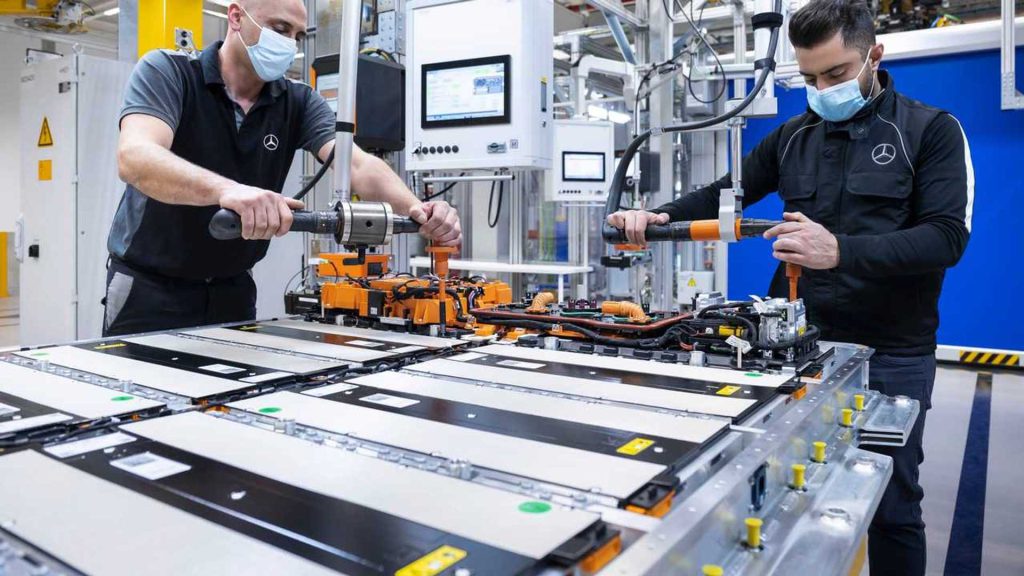 Mercedes-Benz’s producing lithium-ion batteries for its all-electric luxury SUV lineup/ Image Credit: InsideEvs
Mercedes-Benz’s producing lithium-ion batteries for its all-electric luxury SUV lineup/ Image Credit: InsideEvsHowever, a long-standing obstacle that has always held back innovations in battery technology is the limited understanding of what actually occurs inside a battery. Yes, we do know how to manufacture batteries, but we can’t really observe what’s happening at a molecular level within them while they operate.
To simulate the chemical processes that occur within a battery, you can, of course, turn to classical computers — but even the fastest classical computer we have today cannot accurately simulate the chemical processes inside a battery, and it takes days to come up with the simulation.
As such, designing more efficient batteries has always been a laborious process of trial and error that can take decades due to technological limitations.
With quantum computers, companies like Mercedes-Benz can tap on its processing power to find potential materials that can enhance the performance and robustness of EV batteries.
Mercedes-Benz isn’t the only one jumping onto the new tech — many other automotive firms such as Toyota, Ford, and Volkswagen are also leveraging quantum computers as they look to power the EVs of the future.
Quantum computing can solve route optimisation challenges
Aside from players in the automotive industry, ExxonMobil is currently exploring the use of quantum systems to tackle the complexities of shipping the world’s cleanest burning fuel: natural gas.
Natural gas, when compared to coal, emits up to 60 per cent fewer greenhouse gasses and air pollutants for power generation. In fact, it is the world’s cleanest source of fossil fuel which can meet the growing global energy demand while causing less environmental harm, as compared to other fossil fuels.
In order to move these natural gasses from producing regions to markets where natural gas pipelines are not feasible or do not exist, natural gas is liquefied for transport, usually on special ocean-going liquefied natural gas (LNG) ships, or tankers.
 An LNG carrier arrives at an ExxonMobil terminal off Porto Levante, Italy/ Image Credit: ExxonMobil
An LNG carrier arrives at an ExxonMobil terminal off Porto Levante, Italy/ Image Credit: ExxonMobilBut here’s where the issue lies — efficient shipping is absolutely critical when it comes to LNG. LNG needs to arrive on time at specific destinations, or people could run out of power.
Today, the global LNG industry involves thousands of voyages per year across the globe. To handle the scheduling of these voyages in the global supply chain, you’ll need to account for the positions of each ship, on every single day of the year, while satisfying requirements for hundreds of deliveries across the globe.
“This can involve millions of discreet decisions, which means the number of routing combinations we would need to consider would be larger than the number of atoms that exist in the universe,” said Dr. Vijay Swarup, Director of Technology, ExxonMobil.
This challenge further escalates with larger fleets or when you factor in uncertainties like weather disruptions or demand fluctuations, potentially reaching billions or even trillions of discreet decisions.
 ExxonMobil floating storage and regassification vessels/ Image Credit: ExxonMobil
ExxonMobil floating storage and regassification vessels/ Image Credit: ExxonMobilVehicle routing problems such as this are a major problem in the distribution and logistics industry, and there is no other way to possibly solve this problem other than comparing every route possible to identify the most optimal route.
Currently, there isn’t a single computer on the planet powerful enough to handle the scheduling of these voyages efficiently without greatly simplifying these complexities — at least, not yet.
However, with quantum computers, difficult problems such as route optimisation can be solved faster — all while accounting for complex, real-world constraints like limits on ship sizes, as well as the arrival and departure times of ships.
Today, ExxonMobil is collaborating with IBM to explore how to model maritime inventory routing on quantum devices. These mathematical models can also be applied to other vehicle routing problems, including goods delivery, ride-sharing services, and urban waste management.
Singapore startups are at the forefront of quantum tech
Aside from these global MNCs, several quantum computing startups have emerged over the past couple of years in Singapore, aimed at transforming various industries ranging from telecommunications to construction industries.
 From left to right: Dr. Si Hui Tan, Chief Science Officer of Horizon Quantum Computing, and Dr. Joe Fitzsimons, CEO and founder of Horizon Quantum Computing/ Image Credit: Horizon Quantum Computing
From left to right: Dr. Si Hui Tan, Chief Science Officer of Horizon Quantum Computing, and Dr. Joe Fitzsimons, CEO and founder of Horizon Quantum Computing/ Image Credit: Horizon Quantum ComputingThese include Horizon Quantum Computing, a startup that is developing a new generation of programming tools to simplify and expedite the process of developing software for quantum computers.
Horizon’s programming tools remove the need for prior quantum computing experience in a bid to democratise the development of quantum-enhanced applications and make quantum computing accessible to every software developer.
In an interview with Vulcan Post last year, the company shared that it expects to sell to early adopters of quantum technologies in industries such as finance, pharmaceuticals, and energy in the near future. Although its tech is still in the development phase, they are focusing on getting its clients early access and tailoring its generalised tech solutions to specific industries.
Atomionics, on the other hand, is another deep tech startup that is developing quantum sensors that enable navigation without GPS. These sensors have several use cases — they can pinpoint where underground hydrocarbon and mineral reserves are, allow aircraft and submarines to navigate without GPS, as well as detect earthquakes, volcanoes, and underground infrastructure.
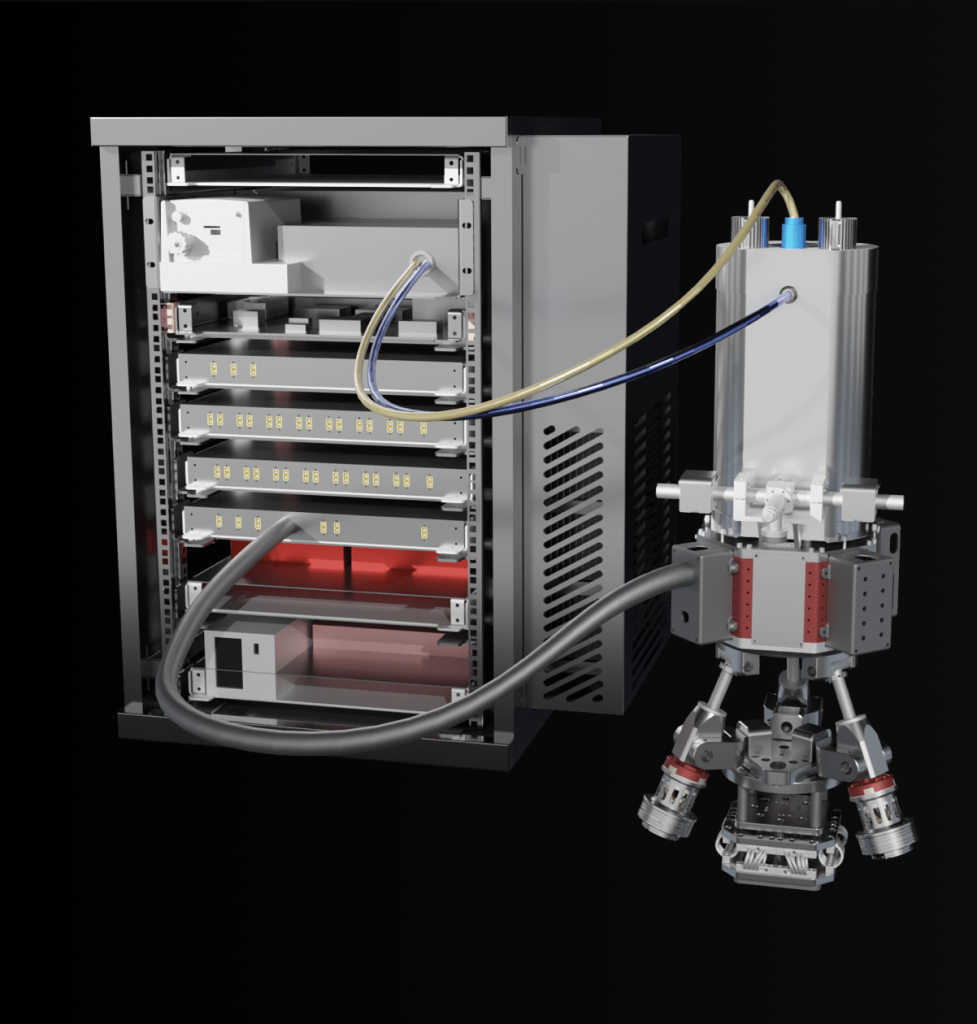 Atomionics’ quantum gravimeter/ Image Credit: Atomionics
Atomionics’ quantum gravimeter/ Image Credit: AtomionicsTo take their quantum sensors to market, Atomionics aims to build a quantum gravimeter that can sense objects hidden under the ground. Users can place this on a moving vehicle even in harsh operating conditions, both onshore and offshore.
Companies in the construction and tunneling industry, for instance, can use this to identify underground infrastructure like utility lines and existing tunnels before embarking on a new project, reducing the risk of disrupting these utilities while helping them plan a tunnel optimally.
Singapore is also stepping up quantum computing efforts
While these real-world applications showcase the promise of quantum computing, the technology is still in its early stages.
The commercialisation of quantum computers still remains a distant goal, even if we can overcome the challenges of scaling this technology. In fact, research analyst GlobalData predicts that the full-scale commercialisation of quantum computing is unlikely to happen before 2027.
In order to boost access to the nascent tech in Singapore, the government has stepped up its efforts with various initiatives over the last year.
At the second Asia Tech x Singapore (ATxSG) summit, Deputy Prime Minister and Coordinating Minister for Economic Policies, Heng Swee Keat, unveiled the launch of three national platforms to grow the city-state’s capabilities in quantum computing, quantum-safe communication, and the manufacturing of quantum devices.
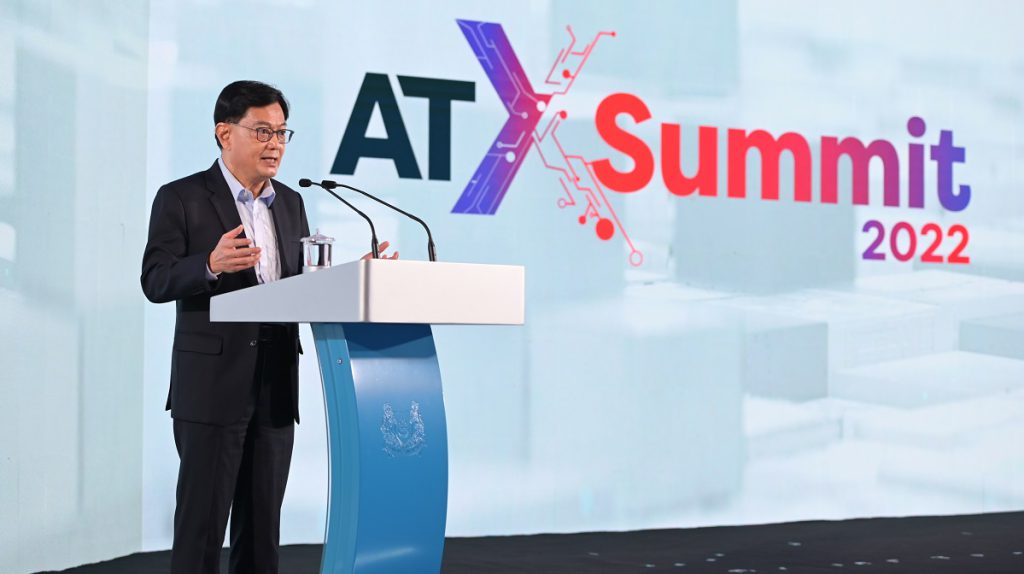 Deputy Prime Minister Heng Swee Kiat at the Asia Tech x Singapore Summit 2022/ Image Credit: Asia Tech x Singapore
Deputy Prime Minister Heng Swee Kiat at the Asia Tech x Singapore Summit 2022/ Image Credit: Asia Tech x SingaporeThe three national quantum platforms — which are hosted across the National University of Singapore (NUS), Nanyang Technological University (NTU), the Agency for Science, Technology, and Research (A*STAR), as well as the National Supercomputing Centre (NSCC Singapore) — will coordinate activities across research organisations and build public-private collaborations to put Singapore at the cutting edge in quantum technologies.
The platforms comprise the National Quantum Computing Hub, which will develop Singapore’s quantum computing capabilities and explore applications through industry collaborations; the National Quantum Fabless Foundry, which will support microfabrication techniques for quantum devices and enabling technologies; as well as the National Quantum-Safe Network, which will conduct nationwide trials of quantum-safe communication technologies that aim to enhance network security for critical infrastructure.
The hub and Fabless Foundry are part of the National Research Foundation’s Quantum Engineering Programme (QEP), and will receive at least S$23.5 million from the QEP for up to three and a half years under Singapore’s Research, Innovation and Enterprise 2020 plan.
Our investment in quantum computing and quantum engineering is part of our approach of trying to anticipate the future, and proactively shaping the future that we want.
– Deputy Prime Minister and Coordinating Minister for Economic Policies, Heng Swee KiatFeatured Image Credit: Shutterstock

 Kass
Kass 
























